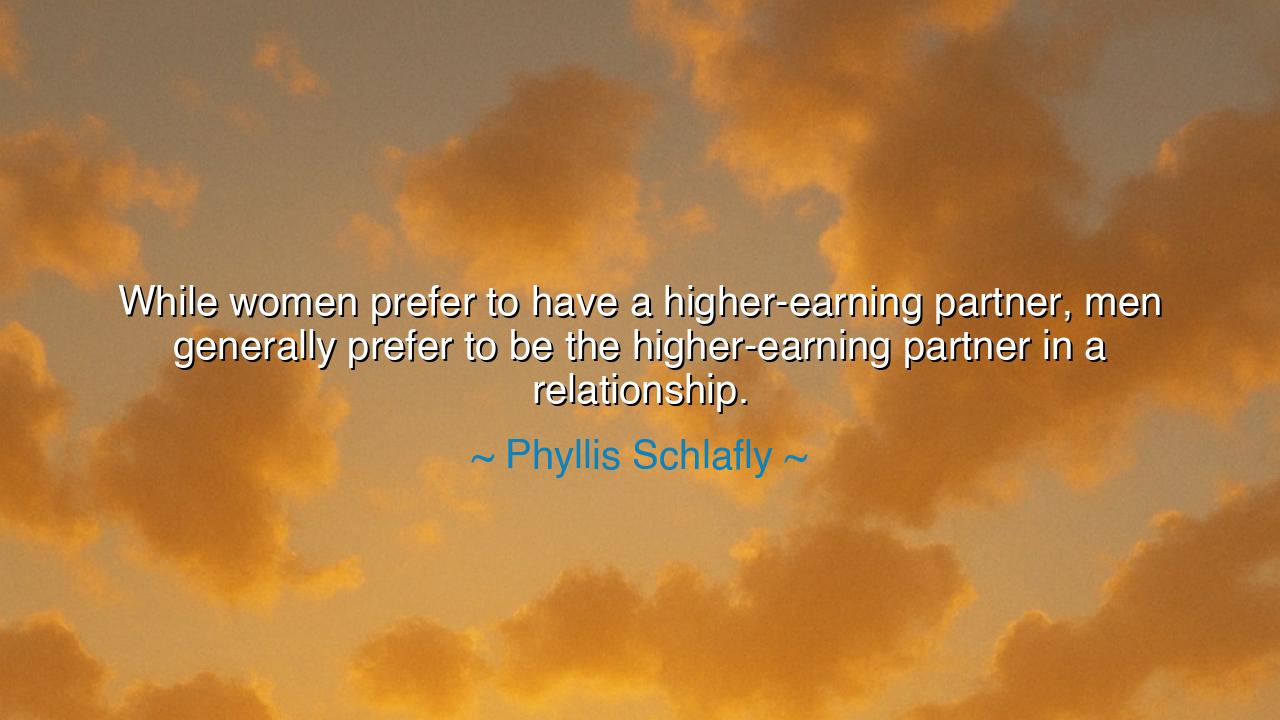
While women prefer to have a higher-earning partner, men
While women prefer to have a higher-earning partner, men generally prefer to be the higher-earning partner in a relationship.






Hear the voice of Phyllis Schlafly, who gazed upon the nature of men and women and spoke thus: “While women prefer to have a higher-earning partner, men generally prefer to be the higher-earning partner in a relationship.” In these words lies not mockery, nor scorn, but the unveiling of ancient patterns that have shaped human unions since the dawn of time. For the dance of relationships is guided not only by affection, but by the deep currents of pride, provision, and desire.
She speaks of women, who often seek in their partner the strength of security, the wealth that shelters and sustains. This yearning is not mere vanity, but a reflection of ages past, when survival demanded a provider, and protection was bound to the measure of one’s store. Thus, the preference for a higher-earning partner is not new, but echoes from the voices of mothers and grandmothers long departed.
And of men, she declares their pride lies not in receiving, but in giving. They desire to stand as the higher-earning partner, not only for wealth itself but for the honor it bestows. For in many hearts, to provide is to prove worth, and to earn more is to bear the mantle of leadership within the bond. Pride and identity are entwined with labor, and from this grows the longing to be seen as the stronger pillar of the household.
Thus, Schlafly reveals a truth both timeless and contentious: that men and women, though joined in love, often measure their roles by coin as much as by affection. This truth may change with the ages, yet its roots run deep, woven into custom, tradition, and nature. To know it is to understand the hidden forces that shape unions, for in the union of hearts there is also the union of power, duty, and esteem.






TRThuan Rin
Schlafly’s quote brings up an interesting point about how money plays a role in relationships. I wonder, though, if these preferences are still rooted in insecurity or pride, or if they reflect a deeper societal pressure to maintain certain roles. As gender equality continues to progress, are these expectations becoming less important in relationships? Or are they just evolving in new ways that are more subtle and less visible?
YLNhu Y Le
The notion that men prefer to be the higher earners while women prefer the opposite feels like an oversimplification of relationship dynamics. Could this idea reflect outdated gender norms that don’t take into account modern relationships? I’m curious to know if there’s a shift happening, especially as more couples are breaking away from traditional roles. Is financial independence from both partners becoming more of a priority than one person earning more than the other?
HNThuy Bao Han Nguyen
I find it interesting that this quote speaks to financial expectations in relationships. On one hand, it acknowledges traditional gender norms, but on the other hand, it’s worth asking whether these preferences are outdated. As women’s earning power grows, does this dynamic still hold true? What impact does it have on relationships when these roles are reversed or when both partners earn equally? Is financial equality seen as less desirable or challenging for some couples?
LNlieu nguyen
Phyllis Schlafly’s quote seems to reinforce traditional stereotypes about men and women in relationships. While there may be some truth to this, I wonder if these preferences are really as rigid as they once were. With more women achieving financial independence, are these old patterns still relevant? Shouldn't relationships be about shared values and mutual support rather than financial hierarchies? It makes me question if financial expectations really define the success of a relationship.
THTran Thu Hang
This quote makes me reflect on societal expectations and how they shape relationships. The idea that women prefer higher-earning partners while men want to be the higher earners raises questions about traditional gender roles. Do these preferences stem from cultural expectations, or are they rooted in deeper psychological needs? Is there a shift happening in modern relationships where these traditional dynamics are no longer as significant, especially with changing gender roles?